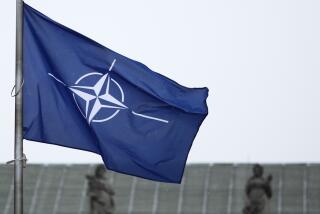U.S. and NATO Have Put the Fox in the Chicken Coop
- Share via
Monday’s accord between the Kosovo Liberation Army and NATO--pursuant to which the KLA is supposed to disarm--appears to have defused a tense situation in Kosovo. Filling the province’s postwar power vacuum, the KLA’s armed and uniformed insurgents for a few days assumed de facto political authority, thereby compromising NATO’s peacekeeping mission and the establishment of a United Nations civil authority to oversee Kosovo. Now, in return for its agreement to disarm, the KLA believes NATO will let the KLA become the core of postwar Kosovo’s army and police force. In essence, the U.S. and NATO are empowering the KLA as Kosovo’s dominant political and military organization. This is a short-sighted policy that will come back to haunt us.
Although it was NATO’s ostensible ally against Yugoslavia, it is hard to grasp why U.S. and NATO policymakers have concluded that the KLA forces are the “good guys.”
* First, the KLA is a nasty and thuggish lot. This is a coalition of the despicable: a radical right wing (descendants from the numerous ethnic Albanians who fought for the Nazis in World War II), a radical left wing (communist hard-liners), liberally mixed with Islamic fundamentalists and drug traffickers and other criminals.
* Second, the KLA’s ideology is inconsistent with America’s postwar vision for the province, which, as President Clinton reiterated this week, calls for creation of a multiethnic democracy. The KLA is hostile toward democracy. As reporter Chris Hedges, who spent more than a year investigating the KLA, writes in the current issue of Foreign Affairs, the KLA has “little sympathy with or understanding of democratic institutions.” And, as its postwar attempt to terrorize Kosovo’s Serbs into fleeing--reverse ethnic cleansing--attests, the KLA rejects the idea of a multiethnic postwar Kosovo.
* Third, the KLA’s long-term political ambitions are antithetical to those of the United States and NATO. Washington and the alliance seek a postwar Kosovo that enjoys substantial self-rule as an autonomous province within Serbia. The KLA, however, is committed to attaining independence for Kosovo and ultimately to uniting Kosovo, by force if necessary, with Albania and with the ethnic Albanian portion of Macedonia, which could trigger a wider Balkan conflict. As Hedges puts it, the KLA is “uncompromising in its quest for an independent Kosovo now and a Greater Albania later.” If the KLA succeeds in achieving its ambitions, it would bode ill for Balkan stability--the purported goal of U.S. policy.
* Fourth, the KLA craftily orchestrated events in Kosovo in order to draw the U.S. and NATO into the conflict against Serbia. Early this year, the U.S. intelligence community warned the Clinton administration that the KLA would attempt to force NATO’s intervention by staging provocations designed to elicit brutal Serb reprisals and thereby gain the West’s sympathy and support. The KLA’s strategy worked: The U.S. intervened in Kosovo’s civil war, absolving the KLA insurgents and naively concluding that the Serbs alone were responsible.
Once NATO went to war with Yugoslavia, it covertly assisted the KLA and acted as the KLA’s air force. This policy was based on the timeless geopolitical axiom: The enemy of my enemy is my friend. But the KLA is on its own side, not America’s or NATO’s. In this case, the enemy of our enemy is our enemy, too. Yet, although the KLA is distrustful of and hostile to the U.S. and its West European allies, and is using NATO to advance its own political agenda, the alliance--in a real-life example of letting the fox into the chicken coop--now has all but invited the KLA to assume power in postwar Kosovo.
The KLA will accept nothing less than statehood. Indeed, the KLA’s interpretation of its understanding with NATO telegraphs the KLA’s intentions: The KLA seeks to transform itself into Kosovo’s national army. Sovereign states have armies; provinces do not. NATO and the KLA are on a collision course because their respective visions of Kosovo’s future are irreconcilable.
Although for now the KLA is committed to disbanding its organized, uniformed units over the next three months, this undertaking is of little practical consequence. As a guerrilla force, with its command structure intact, the KLA is used to operating covertly; it does not need uniformed units to be a potent force in postwar Kosovo. Like the Viet Cong or the Irish Republican Army, the KLA can, if necessary, blend in with Kosovo’s ethnic Albanian population and conduct terrorist attacks on NATO peacekeepers once they have overstayed their welcome and have become occupiers rather than protectors.
By paving the way for the KLA to come to power in postwar Kosovo, the United States has created a political Frankenstein’s monster in the Balkans. The KLA’s emergence as the dominant political power broker in Kosovo is not a good outcome for America and Western Europe, and it illustrates the strategic myopia that has characterized the Clinton administration’s Balkan policy.
More to Read
Sign up for Essential California
The most important California stories and recommendations in your inbox every morning.
You may occasionally receive promotional content from the Los Angeles Times.













